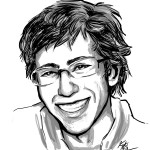This morning was supposed to be different. For the first time in weeks most of us were waking up in our own beds; seeing a parent during breakfast; getting the chance to breathe a little slower, in a long-sought moment removed from the trials of Yale. But come 10:22 a.m., that tranquility was shattered.
 “Unconfirmed report of person with gun near campus. Stay in place,” rippled across inboxes and mobile screens. Comfort turned to fear. The embrace of home perversely became a torturous grip, holding our hearts in place while they yearned to be somewhere else. The Yale community froze — some peering out shuttered windows on Old Campus, others glued to Twitter feeds and NBC streams across the world. Seconds turned to minutes turned to hours before, finally, all clear was announced.
“Unconfirmed report of person with gun near campus. Stay in place,” rippled across inboxes and mobile screens. Comfort turned to fear. The embrace of home perversely became a torturous grip, holding our hearts in place while they yearned to be somewhere else. The Yale community froze — some peering out shuttered windows on Old Campus, others glued to Twitter feeds and NBC streams across the world. Seconds turned to minutes turned to hours before, finally, all clear was announced.
While we are profoundly blessed to have escaped an actual shooter, that fact does not make those preceding moments any less real. That fear — that involuntary ignorance and impotence in the face of some unknown danger — will linger for a long time. We should not forget this feeling. It should serve as an emotional echo, much as the voice of Yale Police announcing a “gunman” on campus will reverberate for those restricted to their dormitories earlier today.
In a cruel irony, a day that trapped Yale within her gates is one that has also reminded us how fundamentally fragile those apparent barriers actually are. There is no bubble, no Ivory Tower, no community of any sort immune from the resolute, ever-marching ubiquity of evil. On the afternoon of the release of the Newtown Report, in a climate where gun violence has become perilously close to a new normal, our campus today grazed the outline of a part of the human condition equally fixed and monstrous — a portion that fate has not been so kind as to spare elsewhere.
As the dust settles around Old Campus and the emergency vehicles drive off, it is up to Yale students to figure out how we treat the events of today. In the coming days, against the backdrop of Thanksgiving — and after a glimpse into what could have been — we can take a deep breath, look a little more lovingly at our family either at home or at Yale and take better note of what we have. However, we also ought to find the obligation latent within this moment of providential exemption. As a community, we ought to discover and exhaustively examine the perspective afforded to us by coming to the brink of tragedy without experiencing its human cost.
This should be a time of both encouraging and frightening reflection, peering honestly into the spectrum of human nature that was on display today.
In one regard, we saw true bravery and selflessness in the first responders, unflinchingly plunging into an unknown scenario — unknown except for its resemblance to the all-too-recent imagery of Newtown, Boston and Virginia Tech. We should force ourselves to answer honestly: Could I have done what they did?
In another capacity, we experienced our intimate proximity to evil. Looking back on the fears of today, perhaps we too might look to whatever wickedness is fixed in our own hearts, granted to a far lesser degree.
We as a campus have been remarkably fortunate today. May we make ourselves better for it, as far too many have recently been robbed of that chance.
Harry Graver is a senior in Davenport College. Contact him at harry.graver@yale.edu.







